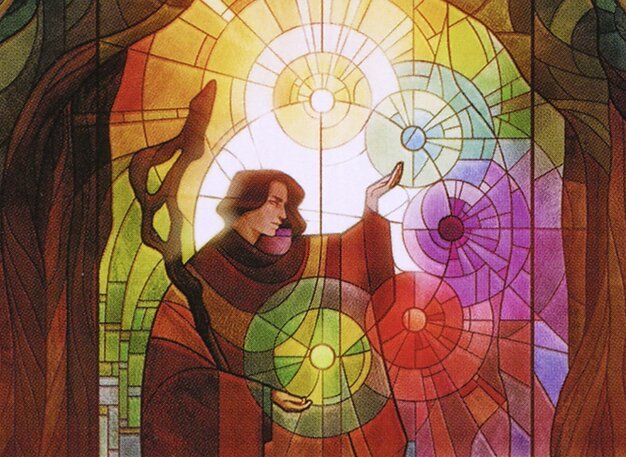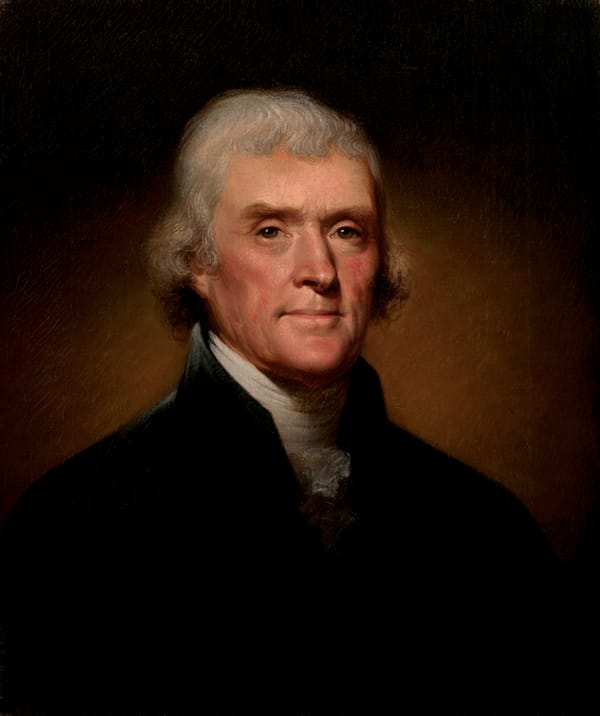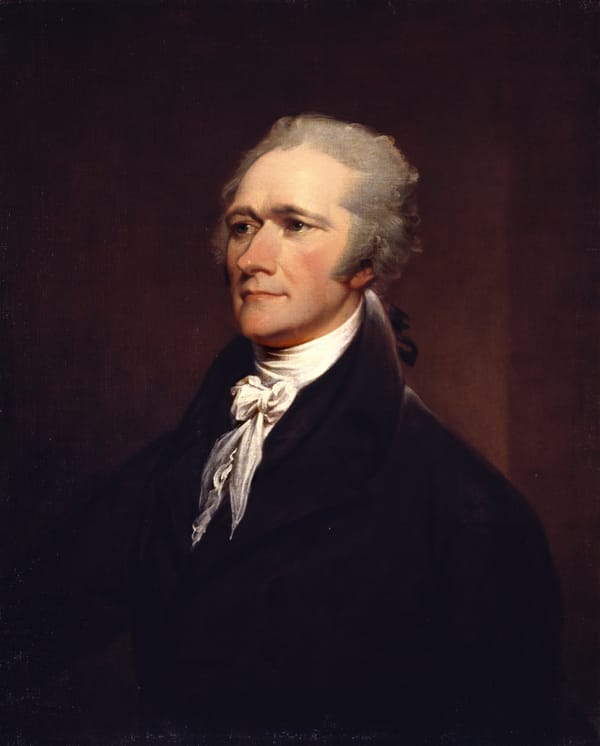Liberalism in Five Colors

A week ago I wrote the following on Bluesky:
I agree with this, BUT ALSO, I do sort of think we need a vision of a green-mana-aligned left-liberalism, that the current orientation is pretty anti-green in a way that bothers me
— Robert Black (@hurricanexyz.bsky.social) 2024-12-08T23:45:11.264Z
This is a thought I've had for a while, that recent trends in how liberals think about environmentalism – most notably the whole "YIMBY" trend in urban policy – have left a bit of a void where the classic nature-loving environmentalism used to be. Which I expressed in terms of the Magic: the Gathering color system.
This post set off a really fun and interesting discussion about the five colors of mana and political philosophy. Samantha RT'ed the above post saying "we need a five-color liberalism," which inspired me to want to write an essay about what each color should contribute to liberal politics.
This is that essay.
Below, I identify and discuss two values associated with each of the five colors that, I think, should be a constitutive part of what liberalism is. Together, these ten values make up a kind of liberal manifesto or creed. (Why two per color? Because that's how many I thought of, duh.) My implicit claim is that a liberalism that omits any of these values, and especially a liberalism that omits the values of any of the five colors altogether, is necessarily flawed, incomplete, and unsatisfying.
(If you have no idea what I am talking about, I just wrote a primer on the MtG color system, exactly for this purpose!)

White
Compassion
Liberalism is first and foremost a politics of kindness. We believe that people ought to be happy, that things that make people happy are good and that things that make people suffer are bad. Moreover, we believe in universal kindness. We liberals believe that everyone matters, that it is good for everyone to be happy, that there is no one whose suffering is of no moral significance. Thus we reject the idea of "friend/enemy" politics: in the final accounting, we have no enemies. There is no one we want to hurt simply for the sake of hurting them. We will fight those who threaten the things we hold dear, but only because we have to, not because we want to.
Law
Liberals believe in law. Which is not to say we believe absolutely in anything that calls itself law. Rejecting the doctrine of passive obedience is one of our founding ideals! Law itself must have certain virtues before it can command our respect. But we also reject anarchism. We believe that the conditions of social life can and should be regulated by laws made in the public interest. That it is right and proper for the community to establish limits on how people can treat each other. This is not order for order's sake: laws are tools to achieve particular ends. But the idea of law itself, the idea that we have enforceable obligations to one another, is a good one, and is an inherent part of learning to live with one another in a single human civilization.

Blue
Progress
Liberals believe that a better world is possible. We believe that the future need not be shackled by the past, that what is does not define what can be. We believe in using human ingenuity to imagine a better future, and then work to make that future a reality. Liberalism is an idealistic philosophy, and idealism necessarily requires the belief that those ideals have the power to change the world. Of course this is not to say that we blindly worship at the altar of progress as such. To the extent that the world already accords with our values, we will look to preserve it, not change it. But we know that our world largely does not accord with our values, and in that context liberalism must also be progressive in character. To give up on the idea of progress is to admit that our entire philosophy is merely academic.
Inquiry
Relatedly, liberals embrace free inquiry in all domains. We do not believe in rigid, unquestioned orthodoxy. Partly this embrace of free inquiry is a pragmatic one: we want to know what works. That requires the scientific mindset, of ideas tested by experiment, of letting the universe tell you when you are wrong. But it is not entirely instrumental. We value knowledge as such. We find the world we inhabit interesting, you might even say fascinating. We think that inquiry is an inherently valuable part of the human enterprise, and therefore that it is to be celebrated, not mocked, if people are able to spend their lives pondering and studying questions of little obvious practical use. This is not so different, in a way, from what makes art valuable: it is simply part of what it means to be human. (Apologies, Mr. Spock.)

Black
Ambition
Liberals mean to accomplish our goals. In some ways this is related to the value of progress. But this is the black side of things, rather than the blue side. Achieving our ends does not only require believing that a better world is possible. It also requires power. Liberals cannot shy away from power, for if we lack power then we cannot protect the things we hold dear. We understand that power is a messy business, and therefore acknowledge that we must reject a certain notion of moral purity. If we want to affect the world, we need to be willing to get our hands dirty, to do our best and accept that our best may fall short of the ideal. This does not mean a total lack of scruples, or that virtuous ends can justify the most vicious of means. But it does mean that we are in this for results, not merely to feel good about our own moral character. Leaving others to suffer to preserve our own souls is a contradiction in terms.
Pragmatism
To accomplish our goals, we mean to use what works. This does not imply a thoroughgoing utilitarianism, willing to make any sacrifice for the greater good. But it does imply that we will not be overly precious about using only the tools that match our self-conception. Markets are a great example here: sometimes markets work! They are a powerful tool, and where markets are the best way to achieve liberal priorities, we will not shy away simply because we associate markets with right-wing economics. We know that we need not endorse a broad philosophy of laissez-faire in order to use a particular tool for a particular purpose. The overarching goal is simply realism.

Red
Freedom
Liberalism is and must be an ideology of freedom. It's right there in the name. If liberals do not seek freedom for all, they are nothing. We seek a world where people are, within reason, free to chart their own course through life. We oppose rigid hierarchies. We want people to be free to be themselves, not forced to fit themselves to an external mould, or follow an imposed life script. It's pretty simple, really.
Again, liberals are not anarchists. Partly this is for white-mana reasons, but honestly it's internal to the red perspective, too. The one thing people should not be free to do, after all, is to subjugate others, to take away their freedom. And those who would do that sort of thing need to be fought. Ideally, that's what states are for. This need not even be a libertarian "minimal" state, if we are sufficiently sensitive to private oppressions. What the state should not be in the business of, however, is telling people what kind of life is right for them.
Passion
Politics is so often about conflict, scarcity, trade-offs, obligations. But it is important not to lose sight of the fact that life is supposed to be fun. The point of all the strain of politics is to build a world where people can follow their passions. Where life is not just constant drudgery and toil, but instead there is room for joy, exploration, creativity. And, yes, sex. People delighting in one another: what could be better? Remember how I said that liberals cherish learning for its own sake? So too do we cherish pleasure, simply in and of itself.
Thus, we reject right-wing narratives of "decadence" and "degeneracy," the Spartan ideal of self-abnegating "hard men." Decadence is great! Wanting to enjoy life to the fullest is not a weakness. Rather, it is the inability to experience joy that turns people bitter and empty. And bitter, empty people can never build a thriving society together. Though it may be true that letting appetite rule us without the constraint of reason is a recipe for disaster, it is also true that reason must ultimately be employed in service of appetite, of our desires, or it is without a purpose.

Green
Pluralism
Green was, of course, the color that sparked this whole discussion. And it is easy to think that green is just conservative by nature. But I think that's wrong. As someone pointed out to me, one of the unique things about the color green is the extent to which it values the other colors. Green, uniquely among the colors, is able to produce any of the other four colors of mana. This is why actual five-color decks are often centered in green: it is the color most suited to making multicolor work.
Which, when you put it that way, starts to sound an awful lot like the core liberal ideal of pluralism. Liberals not only understand that everyone is a little different from everyone else; we celebrate it! Other ideologies see pluralism as an obstacle to achieving whatever perfect plan they envision. Not us! We find the endless diversity of human nature wondrous, and we want to build a society that cultivates that diversity rather than imposing an artificial conformity. Such conformity, after all, is artificial. It is false to the truth of human nature. Any social institutions that reject this truth will therefore necessarily diminish human flourishing – "flourishing," now there's a green-coded word for you!
Community
There is another fundamental aspect of human nature that green thinks we must not lose sight of: we humans are social animals. There are species who thrive wandering alone in the wilderness. And there are times when individual humans may get value out of imitating them. But at our core we are a species who need one another. It is chiefly from the company of others that our lives derive their value. Liberalism is often denigrated as a philosophy of "atomized" individuals, but there is a fallacy behind this allegation: that people cannot live together in harmony while also remaining free. Antiliberal ideologies think that, if people are to be free as the liberals say they should be, then they must necessarily be cut off from one another.
We know this to be a lie. It is a lie meant to convince us that freedom is actually against our nature, that our lives can have no meaning except through assimilation into the collective. But the fascists are wrong about this. Indeed the very notion of "community" belies the fascist ideal, for a single collective organism is not a community. That requires... plurality! An ecosystem of distinct individuals, each living their own life but living those lives in the company of one another. That is the environment in which humans can thrive as humans, not as automata.

